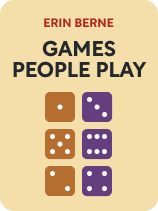

This article is an excerpt from the Shortform book guide to "Games People Play" by Eric Berne. Shortform has the world's best summaries and analyses of books you should be reading.
Like this article? Sign up for a free trial here .
What is social programming? Where does social programming stem from?
In his book Games People Play, Dr. Eric Berne says that people play different kinds of social games depending on their social programming. This programming can come from multiple sources including culture and genetics.
Here’s how social programming drives social interactions.
Eric Berne on Social Programming
Transactional Analysis views a social interaction as a series of exchanges. In many forms of interaction the exchanges are the same type, usually reciprocal—people tend to get along. So Berne distinguishes distinct “genres” of interactions based on differences in their social “programming.”
Eric Berne isn’t clear on where social programming comes from, but we can infer that it’s a bit like genetics. Programming is to social interaction as gene encoding is to expression of human traits: It’s an underlying pattern that determines what comes to be and what doesn’t.
For example, the Western handshake is a long-standing greeting, passed down through thousands of years. We now receive it—Berne calls this “social” programming. We inherit the patterns of interaction embedded in our culture’s traditions.
Like your genes determine the traits that you express, an interaction’s programming determines its content. So the way a dinner conversation works in China differs from the same interaction in America, due to differences in each culture’s inherited scripts.
According to Berne, three sources can determine the content of an interaction:
- Programs created by humans to manipulate the material world—for example, agriculture, mining stone and building cities, turning raw materials into computers, and so on. (All of these require social coordination.)
- The programs handed down by culture: Things like mealtime etiquette, marriage conventions, and shared religious rituals
- The programs of specific family lines, like how you celebrate birthdays, spend weekends, and express your emotions (or not)
| Could Mythology Be the Origin of Programming? Berne doesn’t go into detail about where programming comes from and, continuing the analogy of genetics, it’s similarly difficult to explain where genes originated. Beyond Games People Play, though, Berne did gesture at a possibility. Following the examples of Freud and Carl Jung, Berne argued that the archetypal stories of human mythologies reflect the fundamental patterns of human life. He seemed to be saying that our mythologies may be the origin of programming, which is then passed down from family to family over thousands of years. And fascinatingly, there is a case that the world’s mythologies have a common ancestor and may have spread like genes: Harvard University linguist Michael Witzel claims to have traced modern mythologies to origins over 100,000 years ago. The relatedness of worldwide myths could also explain the presence of human universals—baseline similarities between cultures, like child care, language, and music. The chain of causality, from myths to programming, might look like: The “proto-myth” → similar myths worldwide → human universals → culture-specific manifestations of the universals. Berne’s “programming” is the last link: Most cultures have small talk and parties, but they all do them a bit differently, according to their culture-specific programs. |

———End of Preview———
Like what you just read? Read the rest of the world's best book summary and analysis of Eric Berne's "Games People Play" at Shortform .
Here's what you'll find in our full Games People Play summary :
- The many ways that we relate to one another through “games”
- Why you might be missing out on the fulfillment of game-free living
- How to identify and overcome unhealthy games






